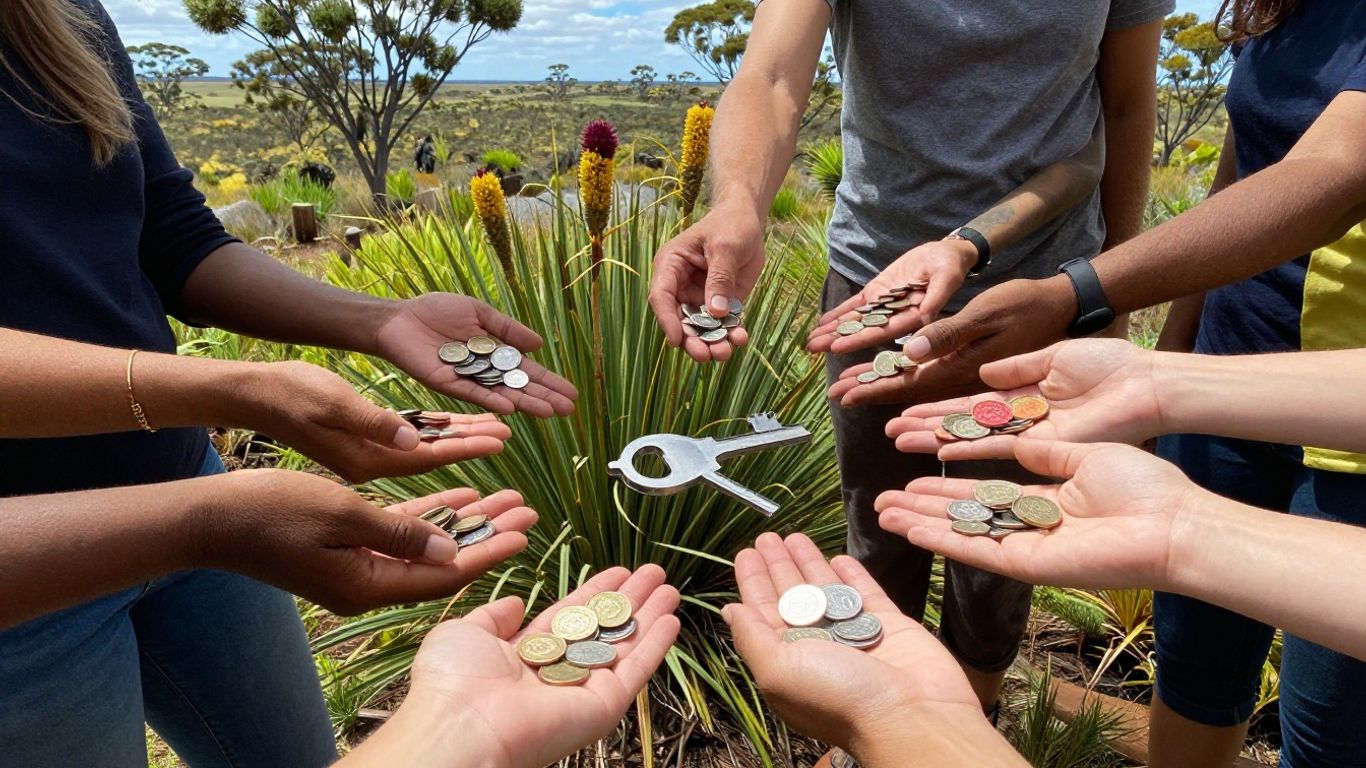G’day, future business owners! Thinking about kicking off something new in Australia in 2025? You’ve landed in the right spot. This article is your guide, helping you find some great australia business ideas. We’ll talk about what people really want, how to get your stuff out there online, and some smart ways to get your venture off the ground. No worries, we’ll keep it simple, so you can get cracking on your dream business.
Key Takeaways
- Talk to your customers a lot. Their thoughts are like gold, showing you what to do better or what new things to offer.
- Always look out for new tech. Things like AI or virtual reality can really change your business and keep you ahead.
- Think about selling your stuff overseas. There might be a big market out there just waiting for what you’ve got.
- Keep an eye on the rules and laws for businesses. They change, and you need to change with them to stay in the game.
- Don’t be scared to try new things and be creative. Sometimes the best australia business ideas come from just messing around and thinking outside the box.
1. Handcrafted Goods Online
Okay, so you reckon you’re a bit of a whiz with your hands? Got a knack for making things people actually want to buy? Well, cobber, you might just be onto something. Selling handcrafted goods online is booming, and there’s plenty of room for Aussies with a bit of creativity and hustle.
The key is to find your niche and make sure your stuff stands out. What makes your creations special? Is it the materials you use? Your unique design style? The story behind each piece? That’s what’ll hook people in.
It’s not just about making something pretty; it’s about creating a brand that tells a story. People connect with authenticity, and that’s what handmade goods offer. Focus on quality, good photos, and clear descriptions, and you’ll be laughing.
Here’s a few ideas to get the cogs turning:
- Jewellery: Think unique designs, sustainable materials, or personalised pieces. You could even start a jewellery making business using a CNC machine.
- Home Decor: Candles, ceramics, textile art, or custom furniture.
- Personal Accessories: Handbags, wallets, or bespoke clothing.
Once you’ve got your product sorted, you’ll need a place to sell it. You could start building your online store using Shopify’s powerful tools and features. Alternatively, you might want to consider selling on Etsy, which has a reputation for handmade goods and one-of-a-kind products (although it is hard to scale using this platform alone).
2. Sustainable Products
Sustainability isn’t just a fad anymore; it’s pretty much expected these days. Aussies are getting more clued up about their impact on the environment, and they’re actively looking for businesses that get it. This means there’s a massive opportunity for businesses that are all about cutting waste, saving resources, and doing things ethically. Plus, the government’s getting behind green stuff too, so there’s support out there for businesses in this space. It’s a win-win, really – good for the planet and good for your bottom line. You might want to think about exploring Australian travel content creation that fits with these ideas.
Businesses that focus on sustainable practises often see increased customer loyalty and positive brand recognition. It’s not just about doing good; it’s about smart business.
Consumers are willing to pay more for sustainable options.
Here are some areas where you could make a real difference:
- Eco-Friendly Packaging: The amount of plastic waste is insane, right? Businesses that can offer alternatives to traditional packaging are onto a winner. Think compostable materials, reusable containers, and innovative designs that minimise waste. Even better if you can source your materials locally.
- Sustainable Fashion: Fast fashion is a huge problem, but thankfully, more and more people are waking up to it. Sustainable fashion brands that prioritise ethical sourcing, eco-friendly materials, and fair labour practises are gaining traction.
- Solar Energy Innovations: Australia’s got sun for days, so it makes sense to tap into solar energy. It’s not just about solar panels on roofs anymore. There’s room for innovation in energy storage, smart grids, and even portable solar chargers. Plus, with energy prices going up, people are looking for ways to save money and reduce their reliance on the grid. Solar energy is a great way to do that.
3. Artificial Intelligence
AI is making waves across all sorts of industries, and Australia’s no exception. It’s not just about robots taking over the world (though that’s a fun thought!), but more about smart systems that can make businesses run smoother and more efficiently. Think about AI-powered customer service, data analysis, and even personalised marketing. The possibilities are pretty wild.
AI is set to transform how businesses operate, offering opportunities for innovation and efficiency gains.
The Australian IT services market is tipped to expand quite a bit in the next few years. This is because more businesses are using things like cloud computing, big data analysis, and the Internet of Things (IoT). They’re putting a lot of money into tech to work better, cut costs, and get ahead of the competition.
Here are a few ways AI is shaking things up:
- AI-powered customer service chatbots to handle common questions.
- AI-driven scheduling and edge analytics that tune feeds and speed in real time.
- Using AI to make things easier, or maybe even blockchain for more secure transactions.
4. Virtual Reality

Virtual Reality (VR) is moving beyond just gaming and entertainment; it’s finding practical applications in various industries. Think training simulations, virtual property tours, and even remote collaboration tools. The tech is becoming more accessible, and Aussies are starting to see the potential.
VR offers immersive experiences that can transform how we learn, work, and interact with the world.
VR isn’t just a gimmick; it’s a tool that can solve real-world problems. It’s about finding those problems and creating VR solutions that are both effective and engaging.
- Training and Education: Imagine surgeons practising complex procedures in a risk-free virtual environment.
- Real Estate: Virtual tours are becoming increasingly popular, allowing potential buyers to explore properties from anywhere.
- Tourism: Experience destinations before you even book a flight.
VR development requires a unique blend of technical skills and creative vision. It’s not just about coding; it’s about designing experiences that are intuitive, engaging, and ultimately, useful.
5. Overseas Sales
So, you’ve got a business brewing here in Oz? Fair dinkum! But have you thought about selling your stuff overseas? It might sound like a big leap, but with the internet and all, it’s easier than you think. Plus, Aussie products often have a good rep overseas, so you might be surprised how well they sell.
Expanding into overseas markets can significantly boost your revenue and brand recognition.
Here’s a few things to keep in mind:
- Research, research, research: Don’t just jump in headfirst. Find out if there’s actually a demand for your product in other countries. What are the local tastes and preferences? What are the import regulations?
- Sort out your logistics: Shipping costs can be a killer. You’ll need to figure out the best way to get your products to your customers without breaking the bank. Consider partnering with a reliable shipping company or using a fulfilment service.
- Think about payment options: Not everyone uses the same payment methods. Make sure you can accept payments from customers in different countries. PayPal is a good start, but you might need to look into other options as well.
Selling overseas isn’t just about making more money; it’s about building a brand that’s recognised around the world. It can open up new opportunities, attract new talent, and give your business a real competitive edge. Plus, it’s a great way to show off what Australia has to offer.
Consider these markets:
| Market | Potential Interest | Key Considerations |
|---|---|---|
| New Zealand | Similar culture, close proximity | Shipping costs, customs |
| Southeast Asia | Growing middle class, demand for quality | Cultural differences, logistics |
| Europe | High purchasing power, niche markets | Strict regulations, competition |
| North America | Large consumer base, diverse needs | Market saturation, time zones |
6. Market Research

Alright, so you reckon you’ve got a ripper business idea? That’s bonza! But before you chuck all your hard-earned dosh into it, you gotta do your homework. Market research, mate, is how you figure out if people actually want what you’re selling. It’s like checking the surf report before you paddle out – you wanna know what you’re getting into.
Basically, market research is all about understanding your potential customers. What do they need? What are they already buying? What are they complaining about? You can’t just guess; you gotta find out for real.
Here are a few ways to get started:
- Surveys and Questionnaires: Whip up a quick online survey using something like Google Forms or SurveyMonkey. Ask specific questions about the problems people face and what they’d be willing to pay for a solution. Keep it short and sweet, or people will bail.
- Social Media Listening: People are always having a whinge or a rave online. Keep an eye on what’s being said in relevant Facebook groups, forums, or even the comments sections of your competitors. It’s like getting free customer feedback.
- Competitor Analysis: Have a squiz at what other businesses in your space are doing. What are they selling? How are they marketing it? What are their customers saying about them? You’re not copying, you’re learning what works and what doesn’t.
- Networking: Go to industry events, trade shows, or even local business meetups. Chat to people, listen to their stories, and get their insights. You’d be surprised what you can learn just by having a yarn.
It’s not enough to just have a good idea; you need to know if anyone actually wants to buy it. Spending a bit of time upfront figuring out what your potential customers are after can save you a whole lot of grief and money down the track. Don’t skip this bit, it’s crucial for any profitable business ideas you might have.
Here’s a table showing potential markets and things to consider:
| Market | Potential Interest | Key Considerations |
|---|---|---|
| New Zealand | Similar culture, close proximity | Shipping costs, customs |
| Southeast Asia | Growing middle class, demand for quality | Cultural differences, logistics |
| Europe | High purchasing power, niche markets | Strict regulations, competition |
| North America | Large consumer base, diverse needs | Market saturation, time zones |
7. New Technologies
Alright, so everyone’s banging on about new tech, but what does it actually mean for starting a business in 2025? It’s not just about having the shiniest gadgets; it’s about using tech smartly to solve problems and make things better. Think about how you can use new tech to make your business more efficient, reach more customers, or offer something totally unique. The opportunities are massive, but you gotta be strategic.
The businesses that will thrive aren’t just adopting tech for the sake of it. They’re finding clever ways to integrate it into their core operations to create real value.
Here are a few things to consider:
- Automation is your mate: Look at ways to automate repetitive tasks. This frees you up to focus on the important stuff, like growing your business and AI applications.
- Data is gold: Collect and analyse data to understand your customers better. What are they buying? What are they saying about you online? Use this info to improve your products and services.
- Cybersecurity is non-negotiable: With everything moving online, protecting your data and your customers’ data is crucial. Don’t skimp on cybersecurity.
The key is to find the right tech for your business and use it in a way that gives you a competitive edge. Don’t just follow the hype; think about what will actually make a difference to your bottom line. For example, consider how pet business can use technology to improve their services.
Here’s a quick look at some areas where new tech is making a big impact:
| Technology | Potential Applications
8. Business Laws
Alright, so you’ve got a ripper business idea brewing, that’s bonza! But before you chuck a shrimp on the barbie and celebrate too hard, let’s yarn about the not-so-thrilling, but super important stuff: business laws. Ignoring these is like driving without a licence – you might get away with it for a bit, but eventually, you’ll get pulled over. And the fines? Ouch.
Staying Compliant
Keeping up with the rules can feel like trying to herd cats, I know. But it’s gotta be done. Australian regulations can change faster than the weather in Melbourne. What was sweet as last year might be a big no-no this year. It’s not just about dodging fines; sometimes, new rules can actually open up new doors for your business. For example, if there’s a big push for going green, that’s your chance to jump in with eco-friendly products or services.
Here’s a few things to keep in mind:
- Keep an eye on government websites for updates. They might look boring, but they’re goldmines of info.
- Join industry groups; they often share news about changes that might affect you.
- Chat to a business advisor who knows the local laws inside and out. They can save you a heap of trouble.
- When you’re planning for the long haul, always factor in that things might change. Better to be prepared, right?
Contracts and Agreements
Contracts are the backbone of any business. Whether it’s dealing with suppliers, customers, or employees, you need to have everything in writing. A dodgy handshake deal might seem alright at the time, but when things go south (and they sometimes do), you’ll wish you had something solid to fall back on. Make sure your contracts are clear, fair, and cover all the important bits. If you’re not sure, get a lawyer to have a squiz. It’s money well spent.
Intellectual Property
Got a unique product or service? Protect it! Intellectual property (IP) is all about protecting your ideas and creations. This could be anything from your brand name and logo to your inventions and designs. Registering your IP gives you the exclusive right to use it, which means no one else can rip you off. It’s like putting a fence around your backyard – keeps the riff-raff out. You can learn more about registering your IP on the IP Australia website.
Think of business laws as the guardrails on a winding mountain road. They might seem annoying at times, but they’re there to keep you from driving off a cliff. Knowing the rules helps you avoid problems and can even show you new ways to do things. So, do your homework, stay informed, and keep your business on the straight and narrow.
9. Creative Ventures
Alright, let’s yarn about creative ventures. It’s not about reinventing the wheel, but finding a way to do things a bit differently, a bit better. Innovation isn’t just about fancy tech; it’s about finding smarter ways to solve problems. Think outside the box, yeah?
The key is to find a niche where your creativity can shine and offer something unique to the market.
Here’s a few things to consider:
- Brainstorming: Get some mates together, chuck around some ideas. No idea is too silly at this stage. Write everything down, even the wild ones. Sometimes the craziest ideas spark something brilliant. You might even stumble upon some sustainable business ideas.
- Look Outside Your Industry: Don’t just focus on what your direct competitors are doing. How do other industries solve similar problems? Can you adapt their methods to your own idea? Sometimes the best innovations come from unexpected places.
- Challenge Assumptions: Why is something done a certain way? Is there a reason, or is it just habit? Questioning the status quo can open up new possibilities. Maybe there’s a simpler, cheaper, or more effective way to do something.
Don’t be afraid to experiment. Not every idea will be a winner, and that’s okay. Try out small versions of your ideas, get feedback, and if it doesn’t work, learn from it and move on. It’s all part of the process.
10. Customer Feedback
Alright, so you’ve got a ripper business idea, but how do you make sure it actually, you know, works? Listening to your customers, that’s how. It’s not just about patting yourself on the back for good reviews; it’s about properly understanding what makes your customers tick, what they reckon is grouse, and, more importantly, what they think is a bit rubbish.
Your customers are basically giving you free advice. They’re telling you what’s working and what’s not, sometimes without even realising it. Ignoring that is like chucking money down the drain. It’s not just about fixing stuff; it’s about finding new ways to make things better, to surprise them, and to keep them coming back for more. It’s how you stay ahead of the pack, especially with all the new technologies popping up.
Think of it like this: if you’re planning a barbie, you don’t just buy a heap of snags and hope for the best, do ya? You ask your mates what they like, if they’re vegetarian, all that jazz. Business is pretty similar.
Here’s a few ways to tune into your customers:
- Direct Surveys: Send out quick, easy surveys after a purchase or service. Keep ’em short and sweet, no one’s got time for a novel.
- Social Media Monitoring: Keep an eye on what people are saying about you online. Facebook, Insta, even local forums – people are always having a yarn.
- Review Platforms: Sites like Google Reviews or Trustpilot are goldmines. Respond to everything, good or bad, and show you’re paying attention.
- Direct Conversations: Sometimes, just having a chat with a customer in person or over the phone can give you the best insights. Ask open-ended questions.
- Feedback Forms: Have a simple form on your website or in your shop where people can drop suggestions or complaints anonymously if they prefer.
Wrapping It Up
So, that’s the rundown on finding those good business ideas in Australia for 2025. It’s really about looking around, seeing what people need, and then figuring out how you can help. We talked about everything from selling stuff you make yourself to getting your head around new tech. The main thing is to keep your eyes open, be ready to try new things, and don’t be scared to change direction if something isn’t working. Australia’s got heaps of chances for folks who are keen to give it a go, so get out there and make something happen!
Frequently Asked Questions
What are some popular sustainable business ideas in Australia?
Heaps of things! Think about businesses that help the environment, like selling stuff made from recycled materials or setting up solar panels. People are really keen on being green these days.
Is selling handcrafted goods online a good idea for 2025?
Definitely! With more people shopping online, selling your unique, handmade items like jewellery, art, or even custom-made furniture can be a real winner. There’s a big market for things with a personal touch.
How important are new technologies like AI and VR for starting a business?
Absolutely. Things like AI (Artificial Intelligence) and VR (Virtual Reality) are changing how we do everything. Learning about them and figuring out how they can help your business can give you a massive leg up.
Why is market research so important before starting a business?
It’s super important! You need to know what people want and what’s already out there. Doing a bit of digging, like talking to potential customers or looking at what other businesses are doing, can save you a lot of grief later on.
Should I consider selling my products or services overseas?
Yeah, for sure! If your product or service is good enough for Aussies, it might be a hit overseas too. The internet makes it way easier to reach customers all over the world, opening up a huge new market for you.
How do business laws impact new ventures in Australia?
It’s a big one. Rules and laws for businesses can change, so you need to keep an eye on them. Knowing the latest rules helps you run your business smoothly and stops you from getting into trouble.





